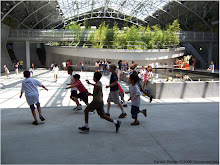In my first post in this series I mentioned that I compared two ACM directories 10 years apart. In that time the children's museum community saw an astounding boom in numbers - in fact, between 1997 and 2007 ACM membership more than doubled. And part of my interest in analyzing the names in the ACM membership in the first place was curiosity about whether naming had changed over that same time period.
So far I have been focusing on the 2007 membership - that formed my baseline. But once I had a pretty clear picture of those organizations names I wanted to look for trends: are names changing over time and if so, in what ways?
So far I have been focusing on the 2007 membership - that formed my baseline. But once I had a pretty clear picture of those organizations names I wanted to look for trends: are names changing over time and if so, in what ways?
The other question was - if I found a trend, was that due to new museums, or were established museums changing their names? So I did some calculations to look at name changes between 1997 and 2007. Over that decade 38 museums, almost 19% of the ACM
membership, changed their name.
Small Change
It turns out that most museum name changes are relatively small. 20 of the organizations that changed their name started out as “Children’s Museum of ____” or “_____ Children’s Museum”. Their name changes focused almost entirely on the order of the words in their name, switching the name of their town or region to either the front or the back of the name! The only exception were two that added a major donor to the name.
Not only were the changes small but arguably not that meaningful - at the end of all these switcheroos half of all ACM members with this type of name have their town at the end, and half at the beginning. So these changes do not point to a larger trend.
Meaningful Change
8 of the museums that
changed their name in the decade between 1997 and 2007 incorporated some of the words “discovery”, “imagine,” and “explore.” Given that 121 museums in the ACM directory describe the activity - what it is visitors actually do - as a key part of their name, this does strike me as important. The percentage of museums focusing on the visitor experience in their name is growing in part because existing museums are changing their names to incorporate this information.
New Kids on the Block
New Kids on the Block
Looking at new members who
joined ACM between 1997 and 2007 this trend toward promoting the activity - over audience, or place - begins to emerge even more strongly.
It can be seen clearly when looking at the three most popular components of names – children, museum, and location – which have all somewhat decreased. In the 2007 ACM Member Directory:
It can be seen clearly when looking at the three most popular components of names – children, museum, and location – which have all somewhat decreased. In the 2007 ACM Member Directory:
- 10% fewer organizations use “museum” in their name than in 1997
- 11% fewer use the word “children,” than did in 1997
- 12% fewer museums use the phrase “children’s museum" than did in 1997
So What?
I started this line of inquiry wondering about the wacky, unique names I torun across, and curious about what kind of advice I might give clients who are grappling with a name change of their own. But this analysis has led me to some additional questions:
- If museums are simply moving words around in their names, why bother? And why not use the opportunity as a chance to try something more unusual?
- Why is the word “kids” the second most popular way to refer to audience? Is it seen as a way to be more playful? Or an attempt to balance out the formality of “museum”? Why not use “family”?
- Who is the audience for the name? Which names are intended for an external audience - potential visitors, donors, and partners – and which are more internal?
- Is the choice to use a made-up name a sign of organizational culture?
- Does the move away from “children’s museum" signal the emergence of a new model? That seems true for places like Zeum, which offers project-based experiences with heavy staff facilitation, and Explora, which is a fusion of science, art, and inquiry that many wouldn’t recognize as a children’s museum.
- What does the audience call these organizations? Do they still say “let’s go to the children’s museum?” on Saturday morning or do they say “let’s go to “i play”?






No comments:
Post a Comment